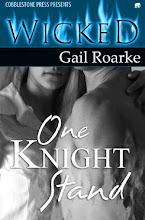Welcome to another weekly post in the How I Write series. This series of posts is the brainchild of Ansha Kotyk, who--along with the other participants, including Yours Truly--haunts the forums (registration required) of the Romance Divas website. You can go
here to find a list of all the participants with links to their individual blog posts. We'll each be posting on the same topic each Wednesday for the next two or three months--longer, if it goes well and we're having fun with it.
This week's topic is Knowing When You're Done, or Am I Ready to Submit or Query?
How do you know when you're done? When can your manuscript benefit from another editing pass, and when are you simply gilding the lily? I can't give you any hard and fast rules. I can only tell you how I look at it.
I'm a believer in writing fast, in writing as much as possible from the subconscious, creative side of the brain. Your subconscious knows everything your conscious mind knows, and plenty more besides--as anyone who has ever been blindsided by a long -forgotten memory coming to the fore can tell you. It remembers
everything. So it knows everything you know about the art and craft of storytelling. Trust it.
Once I'm done with a story--a novel, especially--I put it away for a few days, or for a couple of weeks if it's a novel. Then I reread it from the beginning, looking for anything that leaps out at me. Typos and wordos and other artifacts of writing quickly; rough bits of description that can be improved quickly; and deeper issues. Sometimes I'll rearrange scenes, add or delete scenes, or add transitions to smooth the flow of the story. Once I've done that, I give it to my trusted first reader, my spouse.
Once my spouse has read it and given me a critique, I go over the story once more, making any changes I think advisable, give it a final polish--spellchecking (by eye, on printed paper with a red pen), fixing any other last-minute errors I find, and then I call it finished.
Is it perfect? No, but nobody writes a perfect novel. Nobody ever has, and nobody ever will. Is it the best I can do at the moment? Yes. Will I someday look back at it and cringe? Almost certainly; if I'm still learning and still improving my craft years from now, I certainly
hope I'll be able to see things I could have done better in my earlier work.
Would it benefit from another editing pass? I don't think so, and I'll tell you why. Barring an obvious flaw that I somehow managed to miss every time I've looked at it so far, I've
already given it the best effort of which I'm capable. Continuing to try to polish it is likely to do more harm than good. Whatever creativity I possess, whatever distinctive "voice" I may demonstrate in my writing, will only be diluted if I continue to fiddle with the manuscript. My voice--anyone's voice, really--is freshest with as little editing as possible.
I believe I'd be better advised to send the current manuscript out into the world to sink or swim on its merits than to continue polishing it to a mirror finish. Any lessons I learned from writing that story, or from the critique I got, or from editorial replies, are best applied to all my future work. I will learn more from applying those lessons to
new tales than I will by trying to retrofit them to an earlier story.
So...I know I'm done when I've had at least one other person read the story and give me a reaction, and I've revised the story
once based on that critique. I never, ever ask someone to re-read the story after I've made the changes (or some of them) that they suggested. After all, if I didn't make the changes they think are necessary, why should I expect them to have changed their minds? And if I did make the suggested changes, how can they complain?
As for submissions...if you're sending out a short story, it goes to one market at a time. The cardinal rule is,
send it to the top markets first, however
you define a "top" market. Maybe you want to be read by as many people as possible, or you want desperately to be published in a particular magazine. Maybe you just want as much money as possible for your work. Whatever the criteria you use, don't sell yourself short. Don't assume they'll reject it. Let the
editor(s) decide whether they want your story.
That doesn't mean you should ignore their guidelines. Don't send flash fiction to a market that wants novellas. Don't send "sweet" romance to a publisher who only prints scorching erotica. But if there's any doubt in your mind about whether your story suits their market? Send it to them. Let THEM decide. They may just like it enough to make an exception. And the worst thing that will happen if they don't like it, is they'll send you a rejection letter. Eh. You're going to get lots of those over the course of your career. Get used to it.
If you're sending out a novel, send out multiple submissions. I send my novels to five publishers at a time, and as rejections come back, I send it out again so that it's always out at five publishers. I also ignore "no unsolicited manuscripts" rules. Not everyone will agree with that stance, but it works. I know--because I received a rejection on a novel from a publisher who "doesn't accept unsolicited manuscripts". The rejection letter came from a second editor, who had looked at the manuscript at the request of the editor to whom I'd sent it. Yes, they then rejected the novel--but they considered it. They did, in fact, read it despite the alleged rule against unsolicited manuscripts.
No editor wants to be known in the industry as the one who rejected the next J. K. Rowling
sight unseen so that some other publisher makes a fortune on the book. They're going to look at everything that comes in the door, even if only briefly. But unless you're a name author already,
everyone gets only a brief look--unless you grab the editor by the throat and make him miss his subway stop because he's caught up in your story. In which case, rules or no rules, he's going to want to buy your novel. And again, the worst thing to happen to you if they don't like it is, they send you a boilerplate rejection letter that says "we don't accept unsolicited manuscripts". But it's just that: boilerplate.










You've got some gems in here, especially about the way to submit a short story versus a novel. It's something I had to learn the hard way.
ReplyDeleteAnd this bit is key: "Is it perfect? No, but nobody writes a perfect novel. Nobody ever has, and nobody ever will. Is it the best I can do at the moment? Yes."
Thanks! Yes, the urge to polish and polish and polish a manuscript is often just a way to deal with fear of rejection. If you never send it out, it can't be rejected. It also can't be accepted. Fear will hamstring you in many ways if you let it. (Heinlein's Rules for Writers are a sovereign cure, if you follow them religiously.)
ReplyDelete